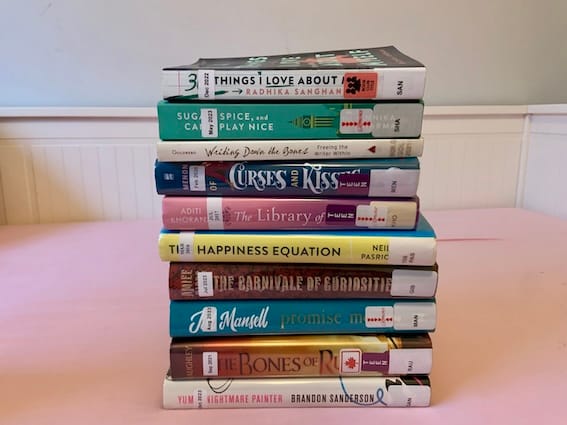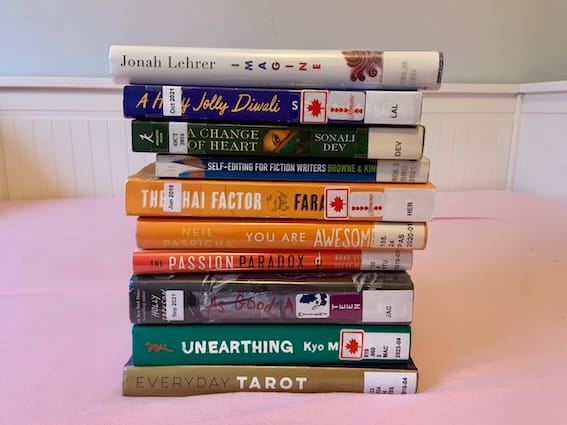remnants of a past life (note 5)
Redefining what a successful outcome is for me.

Sometimes, decluttering is not just for the objects gathering dust in the basement or the attic. Oftentimes it's got to do with clearing out stuff and thoughts that clutter our day-to-day spaces and life.


I returned to the library a total of 20 books today, all unread. These books have been lying not on the shelves but on the very daybed you see in the pictures.
This daybed is in my workroom. I didn't realize it but seeing all those unread books piling up had begun to irk me.
Book hoarding is one of my addictions.
Earlier (about a decade ago), I used to buy books. When we left from Singapore, we decided against carrying our book collection. By then, I was a Kindle addict. I only carried with me a few treasured paperbacks — Neil Gaiman's works, The Night Circus by Erin Morgenstern, and a handful of other titles.
While I don't buy as many books now, every time I go to the library I fill my bag with several new titles. All with good intentions of devouring them.
But there are only so many hours in a day. And if I'm not careful, reading ends up taking place at the expense of writing, and that's not a happy place for me.
So anyhoo, the books had been piling up.
I've been sick the last couple of days, just coughing and getting body chills, feeling super tired and unable (unwilling) to think much. I haven't gotten to the writing desk in almost a week now.
But this morning, I was determined to start clearing the decks, in the hopes that I'd be able to get back on track tomorrow. Even though I haven't recovered, I'm quite sick of waiting to get better. Also, I needed some fresh air and a change of scenery. Under such circumstances, what better place to head to than the library?
I don't know if it's do with me being sick, but for the last few days I've been in an awfully negative thought spiral.
What stalls me from consistently writing fiction is this nagging worry that I'd never make enough of an income from books.
I'd have a good 2—3 days of writing, then that thought would sneak back into my head. And down into a negative spiral I'd go.
What's the point of this?
This is so hard. This is taking so much time.
What if this book I'm writing doesn't sell?
What if I never make money from writing?
What if I spend the rest of my life writing and never make decent money from it?
What a waste of time and effort all this would end up being? It feels like an indulgence. I should just get a real job, even if it's one with minimum wage, and forget about writing completely.
And then I'd somehow hit rock bottom, find myself on an upward spiral, get back to the writing desk and build momentum, and feel good about my path for the next few days.
Until the next seed of doubt plants itself in my head and down with it I go into the murky depths of despair and desperation.
Conventional wisdom has it that when you have more books in your inventory, the odds of sales and earning increases. Then I'm suddenly bogged down by the worry that if writing this one book is taking so much time and effort, and bringing with it so much anxiety, how would I ever live through writing several more?
This is what I was referring to in my newsletter for January, which I sent this past Sunday. (In case you didn't know, Monthly Missives is a free newsletter and packed with musings on the creative life.)
Anyhoo, this is the dread I was mentioning, the dread I feel when it's time to show up for work, and how that paralyzes me, prevents me from writing, and feeds more fuel to the anxiety that I'm not writing fast enough to be able to make some kind of income from this profession.
What a tangle!
I do know what the problem is. It's to do with me worrying about the outcome so much that I'm not able to stay focused on the process. Which continues to derail the process and adversely affects the outcome even more, like a self-fulfilling prophecy.
Then how do I continue to motivate myself to keep going, when I'm not seeing the kind of results I hope for?
I don't have an answer to this question.
Vaguely, I can remind myself that I should focus on the process, not on the outcome. But without striving towards (which means, expecting) a reasonable outcome, investing a lot of time and effort in the process feels like a waste ... like an indulgence ...
But the other way to look at it is — one is in the present, the other is in the future. And only one of them really exists in this intersection of space and time.
Because when tomorrow itself isn't guaranteed, why am I terrifying myself and squandering precious moments today on imaginary happenings in a distant future?
Ephemeral! My word of wisdom for the year. How quickly I forgot that too!
Now, when I manage to get the thought of the future (and hence, outcome) out of my head, how do I motivate myself to make the most of today?
What if I can tie the outcome to the process?
What if the outcome is the execution of the process itself? And not the bells and whistles we attach to it, especially the bells and whistles that come from the outside world in terms of views, likes, sales, 5-star ratings and reviews? Not even the bells and whistles we generate internally in terms of how productive we were, how good or bad the product of the process turned out to be?
The more time I've spent in the writing industry, the more I can see how subjective it is. Everything is made up of the opinions of others — ratings, reviews, what makes a good story, what makes a good blurb, what makes a good book cover ... every single thing seems to be riding on the collective opinion of the world outside, which in turn is often shifting and quite turbulent.
How could I, a small human being, one among millions and billions, possibly influence that?
Whether or not people like my writings, whether or not they take the time to let me know, whether or not they'd spread the word about my works to others ... there's no way for me to influence or engineer or manipulate that.
Yet, how easily do we blame ourselves when we don't get the results we want, when we don't get the results we're told we'd see if only we worked hard enough and never gave up?
How easily do we convince ourselves that we didn't get our desired outcome because we didn't work hard enough and gave up when the going was tough?
Maybe we are chasing the wrong outcomes. Money. Fame. Status. Prestige.
Maybe what we need to focus on is crafting an intentional day.
I'd say — an intentional life — but that feels like a huge, vague, nebulous thing. I think I can focus on one day at a time.
A day in which I make choices about work and life based on my values, on what matters to me.
A day spent writing and parenting is a great day. A day spent alive and healthy is a great day.
Just because my books aren't being read by millions doesn't make them any less worthy. Just because we live an ordinary life doesn't make it any less valuable.
I'd sometimes say to KrA, "A good day for me is one in which I haven't shouted or been angry or anxious. Isn't that too low a bar to settle for?"
Actually, it is quite a high bar and, in fact, one of the very few meaningful ones to me. I often realize the value of that goal and outcome only when I overlook it and end up an emotional wreck.
So here's redefining my primary goals and outcomes for the year:
- Writing and publishing my books.
- Spending a lot of fun time with D and KrA.
Everything else is really secondary, and not worth distracting myself from my primary goals for.
(Phew! Nothing like decluttering and blogging to gain a little clarity on life. 😅)




